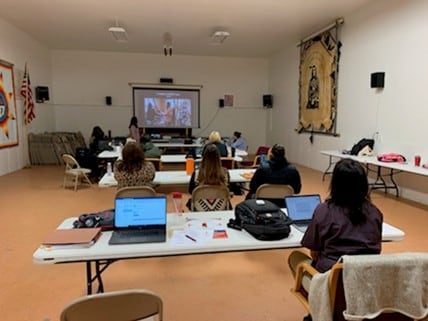Rocky Mountain Tribal Leaders Council

PHWEIC Health Camp in Great Falls, Montana
Christie Farmer is a mother, mentor, student, 2021 Montana Campus Compact Student Volunteer of the Year, and alumna of the Public Health Workforce Expansion in Indian Country (PHWEIC) program. During her two years as a Public Health Associate at the Blackfeet Community College in Browning, Montana, she was able to promote opioid use awareness and education in her community and further her educational aspirations. According to Christie, “I have a lot to offer with the experiences I have faced and overcome, […] and I have the confidence to have a voice when I thought that I did not.”
Christie is one of 42 students that participated in PHWEIC, a public health workforce development program created by the Rocky Mountain Tribal Leaders Council (RMTLC). RMTLC’s 2016 Tribal Public Health Workforce Needs Assessment [PDF – 38 pages] highlighted that “there are 50,000 fewer public health workers in the United States today compared to 20 years ago, and tribes have been heavily impacted by the shortage of tribal health workers.” PHWEIC began in 2018 to introduce tribal college students to the field of public health and build public health capacity in tribal communities.

1 Salish Kootenai College of the Confederated Salish and Kootenai Tribe
2 Blackfeet Community College of the Blackfeet Nation
3 Aaniiih Nakoda College of Fort Belknap Tribe
4 Little Big Horn College of the Crow Tribe
5 Chief Dull Knife College of Northern Cheyenne
6 Fort Peck Community College of the Fort Peck Tribes Assiniboine-Sioux
RMTLC strengthened partnerships with tribal colleges and tribal health departments in their region to build a foundation for the PHWEIC program. They initially onboarded six tribal community colleges in Montana (see Figure 1). RMTLC works with Public Health Associate students at these colleges to implement community-based projects to address opioid overdose prevention, provide public health learning sessions, and offer college readiness support and mentoring. According to RMTLC, over 80 percent of these students are non-traditional students, who have children, live in multi-generational homes, and often have lived experiences of an opioid use disorder. Like Christie Farmer, these students’ experiences and connections to their communities strengthen their work in opioid overdose prevention.
Public Health Associates work with tribal health departments and community members to implement Quick Impact Projects that address opioid overdose prevention in tailored, culturally relevant ways. These projects are designed to be low-cost and efficient while simultaneously building on the cultural strengths of each community. Students work with advisors and subject matter experts throughout the project to develop content knowledge and public health skills, such as community assessments, budget development, and evaluation. They are also able to network with peers and share best practices on monthly calls facilitated by RMTLC staff.
Highlight: Community Engagement in Opioid Use Disorder Education
Blackfeet Community College is a tribal land-grant community college on the Blackfeet Reservation in Browning, Montana. Quick Impact Projects focused on increasing awareness and education about opioid use disorder. Over 100 community members attended a drive-in movie night featuring education about opioid use disorder. Community members also came together to create a mural showcasing traditional healing practices and engaging youth about substance use prevention.

The PHWEIC program has had substantial impacts on tribal communities and Public Health Associates alike. The Quick Impact Projects have engaged large numbers of community members, and students have received requests from community members for additional community events. RMTLC staff have also noticed increased awareness of opioid use disorder and prevention activities in communities, particularly in Year 3 of the project.
Students have emphasized how much they enjoyed using their traditions and culture to approach healing towards current health issues in the community. They observed it was more relatable and impactful, especially with Elders’ involvement. Over 80% of students have successfully completed their projects and graduated with their associate’s degree. Many have pursued higher education or were hired by their tribal community college, tribal social services department, or tribal health department upon graduation. Perhaps most significantly, Public Health Associates have expressed a desire to continue serving their community. One Aaniiih Nakoda College student said he “felt very strongly that his work in the future needs to benefit his small community.”
Highlight: The iíwaálío Project
Little Big Horn College is a tribal land-grant community college on the Crow Indian Reservation in Crow Agency, Montana. In Year 3 of the PHWEIC program, the college implemented “The iíwaálío Project,” which translates to pain pills in the Crow language. The goal was to increase awareness and prevention of opioid use in their community through a traditional prayer walk. Seventy-five community members participated in the prayer walk, which featured a prayer and song from a tribal elder, 2-mile walk, and opioid use disorder education.
Looking ahead, RMTLC staff members hope the PHWEIC program continues to create and sustain a workforce in Indian Country. They see the program’s success in respecting each tribe’s traditional approaches to healing and building trusting relationships with students and advisors. In less than four years, the PHWEIC program has cultivated environments for students and the communities they serve to showcase their resilience. “I want to help others that were like me, to help them see that we do recover,” says Christie Farmer. “No matter what, it gives others hope and the courage to change.”
Acknowledgements: Special thanks to David Porter, Lauren Big Hair, and Letesia Left Hand (Rocky Mountain Tribal Leader’s Council PHWEIC Team); Christie Farmer; Hillary Maxwell, Aaniiih Nakoda College; and Kimmy Walks, Little Big Horn College for their contributions to this story.